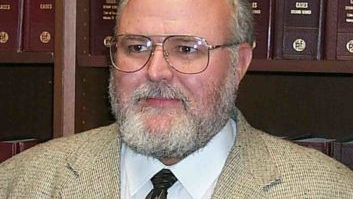Ask anyone about Jules Cohen, and the words you’ll hear over and over are “generous,” “gentleman,” “reason” and “presence.” As the word of Cohen’s passing Tuesday night continues to ripple across the industry, Radio World asked some of his colleagues from the Association of Federal Communications Consulting Engineers to share their memories and impressions of a man lauded for his calm head and human approach to civil engineering, who was an “unknowing mentor” to many and an adversary to no one.
Raymond Benedict, director of spectrum management at CBS, calls Cohen a “legend in the industry,” and said he particularly associated Cohen with the establishment of radio frequency hazard standards.
“He inspired all of us,” Benedict said. “He was active in all areas of broadcasting.”
Cohen’s friend George Devault, a station owner in Kingsport, Tenn., shared a couple memories via email:
“I had a long cell phone conversation with Jules during the holiday season last year. I was taking a day off from work and was taking the dog on an extended walk. We reminisced a good bit, talked about FM’s early days and about digital TV. Did you know that among his many field assignments through the years [one] was crawling around atop the World trade Center taking RF readings re: exposure of humans to radiation?
“Of course, he worked on the digital TV field tests in Charlotte. He said that one of his greatest disappointments was how poorly digital TV worked on the VHF low band. Their Channel 6 tests in Charlotte apparently did not reveal the magnitude of the problem.
“Right after 9/11, I stopped in D.C. on a drive back to TN from Philly. Jules joined me at the Officers’ Club at Fort Myer for dinner. He knew I was staying there, and it was his choice. Security was extreme. Guys dressed in black with AK-47’s and German Shepherds were roaming around that area where the Joint Chiefs live and near the Distinguished Visitors Quarters at Wainright Hall where I was staying, “Space A.” Extra roadblocks, etc.
“Jules was driving a modified van, into which he could bolt his wife’s wheelchair when he got her out of the nursing home for Sunday drives. He was late to the O-club, and when I asked what had happened, he related that the guards at the gate had been going over his van with a fine toothed comb: Mirrors underneath, etc.
“I apologized and asked him how he finally convinced them to let him in. He smiled and pulled out his Navy Lieutenant’s military ID from World War II, which he had kept in his wallet for all those decades. He and Ann Mazor Cohen took a hiking vacation somewhere in the Maritime Provinces only a couple of summers ago!
“We shall truly miss him!”
James Hatfield of Hatfield and Dawson grew up in the same part of the country as Cohen — they both attended Garfield High School in Seattle, famous for another alumnus, Jimi Hendrix — and, though they graduated about 20 years apart, they had some of the same teachers.
“We used to reminisce about that,” Hatfield said, adding that he always took every moment he could to visit with his distinguished friend. They’d talk about the area of Seattle that raised both of them and how it changed over time.
As Hatfield recalls, “There are bakeries with this wonderful bread, and kosher butchers. All that went away over time; the whole neighborhood went through this demographic shift … It was a little bit after Jules was there, because he was pre-war. But it wasn’t so long that you couldn’t have had the same instructors in high school.”
In fact, Cohen and Hatfield’s fathers worked together.
Hatfield and Cohen interacted frequently as professionals, too: Both served on the IEEE committee on radio frequency exposure and once they stood on “opposite sides of a couple FM cases” in Las Vegas — too long ago for Hatfield to remember the details (“It was resolved by a mysterious fire that decided to burn everything up, I don’t know if it was an insurance fire”).
The last time Hatfield saw his friend was in Florida, several years back, at a meeting of the ISIS Committee. He says it was bittersweet to see the aging Cohen, who was well into his 90s when he died, because of his far-advancing years. “You sort of cherish the last time you see someone.”
So what can the next generation of engineers learn from the legacy of Cohen?
“You have to be able to cast a cool eye toward these issues, think about them rationally and not get carried about by propaganda,” Hatfield said. “That’s what will carry forward — the ability to analyze things in an intelligent manner. He was pretty good at that. He took a lot of the changes that came along and was able to deal with them and profit from them. That’s what’s going to be required in the future.”
Although Sellmeyer Engineering’s Jack Sellmeyer never worked directly with Cohen, he enjoyed a friendship with Jules for more than three decades, and often interacted with him at the AFCCE meetings and NAB Shows.
“I’ve never heard anyone make a negative comment about Jules,” said Sellmeyer. “He was just very much a mentor for the younger people. I’m about 20 years younger than him [and] there were times that I had occasion to call and ask a question about either some project he was working on or a question that I knew he had some expertise in. He was always very generous with his time and always willing to listen to the younger people.”
Cohen’s reach extended even to people who never knew. Tim Cutforth, of Vir James Engineers, said that even though he never became acquainted with Cohen personally — since Cutforth lives in Colorado, the east coast contingent can sometimes seem mighty far away — he was well aware of the impact Cohen made on many of his colleagues.
“Some of the people that trained me had worked for him. Jules Cohen has basically been here longer than anyone can remember almost,” Cutforth said. “He’s one of the fellows that defined the industry.”
“Everybody who knew him just feels this loss very deeply,” said Garrison Cavell, of Cavell Mertz & Associates Inc. “He was an amazing man and meant a lot to a lot of us younger puppies who either worked with him or worked around him.”
Cavell first met Cohen when he moved to Washington in the early 1980s to work for another consulting engineer firm.
“He was very patient and kind to a young engineer who was full of enthusiasm and not as much wisdom or judgment as him,” Cavell said. “He never made you feel like an idiot. He was unselfish about helping people come along, and very generous.”
Cohen excelled, Cavell says, at not only the technical aspects of his job but “more of the soft issues,” particularly controversial ones where egos and tempers could flair.
“He’d come into a room and acted as a statesman,” he said. “[Cohen] could see all sides of an issue. It was an amazing thing to watch. He was always the gentleman; always the voice of reason. Even if he had to pillory you, it was well done, you didn’t feel victimized.”
Whether it was dealing with the FCC or with the radiation issue, “He was deft in his handling of people,” Cavell said. “Everyone wanted to be like Jules. I don’t know that anyone can. He touched a lot of lives.”
If there’s one takeaway about Jules Cohen’s career and life in the industry, Cavell believes it’s this: “I learned that our business is still about people. The technology is part of it. Even in our rush to embrace all this technology, it still boils down to human beings. He would quietly remind you of that.”
A memorial service for Jules Cohen will be held on Nov. 23 at 11 a.m. at Temple Rodef Shalom, 2100 West Moreland St., Falls Church, Va.












